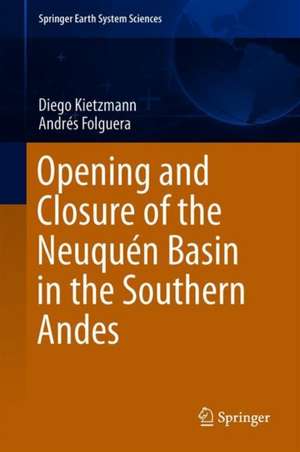Opening and Closure of the Neuquén Basin in the Southern Andes: Springer Earth System Sciences
Editat de Diego Kietzmann, Andrés Folgueraen Limba Engleză Hardback – 15 ian 2020
| Toate formatele și edițiile | Preț | Express |
|---|---|---|
| Paperback (1) | 802.35 lei 38-44 zile | |
| Springer International Publishing – 26 aug 2021 | 802.35 lei 38-44 zile | |
| Hardback (1) | 819.29 lei 38-44 zile | |
| Springer International Publishing – 15 ian 2020 | 819.29 lei 38-44 zile |
Din seria Springer Earth System Sciences
- 18%
 Preț: 1023.74 lei
Preț: 1023.74 lei - 18%
 Preț: 1405.09 lei
Preț: 1405.09 lei - 18%
 Preț: 953.65 lei
Preț: 953.65 lei - 18%
 Preț: 888.18 lei
Preț: 888.18 lei - 15%
 Preț: 653.00 lei
Preț: 653.00 lei - 18%
 Preț: 1394.03 lei
Preț: 1394.03 lei - 18%
 Preț: 897.65 lei
Preț: 897.65 lei - 18%
 Preț: 997.83 lei
Preț: 997.83 lei -
 Preț: 386.22 lei
Preț: 386.22 lei - 15%
 Preț: 642.03 lei
Preț: 642.03 lei - 15%
 Preț: 639.73 lei
Preț: 639.73 lei - 24%
 Preț: 804.33 lei
Preț: 804.33 lei - 15%
 Preț: 642.51 lei
Preț: 642.51 lei - 15%
 Preț: 640.24 lei
Preț: 640.24 lei - 18%
 Preț: 1244.89 lei
Preț: 1244.89 lei - 15%
 Preț: 646.30 lei
Preț: 646.30 lei - 20%
 Preț: 586.49 lei
Preț: 586.49 lei - 18%
 Preț: 733.46 lei
Preț: 733.46 lei - 18%
 Preț: 1229.73 lei
Preț: 1229.73 lei - 15%
 Preț: 641.53 lei
Preț: 641.53 lei - 20%
 Preț: 578.61 lei
Preț: 578.61 lei -
 Preț: 374.37 lei
Preț: 374.37 lei - 24%
 Preț: 680.56 lei
Preț: 680.56 lei - 20%
 Preț: 576.88 lei
Preț: 576.88 lei - 18%
 Preț: 973.56 lei
Preț: 973.56 lei - 24%
 Preț: 829.74 lei
Preț: 829.74 lei - 15%
 Preț: 639.73 lei
Preț: 639.73 lei - 15%
 Preț: 639.90 lei
Preț: 639.90 lei - 15%
 Preț: 695.85 lei
Preț: 695.85 lei - 18%
 Preț: 948.92 lei
Preț: 948.92 lei - 18%
 Preț: 958.38 lei
Preț: 958.38 lei - 24%
 Preț: 789.37 lei
Preț: 789.37 lei - 18%
 Preț: 956.99 lei
Preț: 956.99 lei - 24%
 Preț: 799.22 lei
Preț: 799.22 lei - 20%
 Preț: 569.00 lei
Preț: 569.00 lei - 15%
 Preț: 637.28 lei
Preț: 637.28 lei - 15%
 Preț: 634.82 lei
Preț: 634.82 lei -
 Preț: 408.86 lei
Preț: 408.86 lei
Preț: 819.29 lei
Preț vechi: 1078.02 lei
-24% Nou
Puncte Express: 1229
Preț estimativ în valută:
156.79€ • 170.25$ • 131.70£
156.79€ • 170.25$ • 131.70£
Carte tipărită la comandă
Livrare economică 18-24 aprilie
Preluare comenzi: 021 569.72.76
Specificații
ISBN-13: 9783030296797
ISBN-10: 3030296792
Pagini: 513
Ilustrații: XX, 513 p. 177 illus., 165 illus. in color.
Dimensiuni: 155 x 235 mm
Ediția:1st ed. 2020
Editura: Springer International Publishing
Colecția Springer
Seria Springer Earth System Sciences
Locul publicării:Cham, Switzerland
ISBN-10: 3030296792
Pagini: 513
Ilustrații: XX, 513 p. 177 illus., 165 illus. in color.
Dimensiuni: 155 x 235 mm
Ediția:1st ed. 2020
Editura: Springer International Publishing
Colecția Springer
Seria Springer Earth System Sciences
Locul publicării:Cham, Switzerland
Cuprins
The Neuquén Basin: Stratigraphy, subsidence controls and basin closure.- Heterogeneities and syn-rift evolution of Late Triassic-Early Jurassic Precuyano Cycle.- Structure of the Precuyo synrift in the Valenciana depocenter.- Structure of the Precuyo synrift in the Cara Cura-Sierra de Reyes depocenter.- Early Jurassic magmatism.- High-resolution sequence stratigraphy and main controls of the Middle Jurassic Cuyo Group.- Depositional environments and hyperpycnal shelfal sedimentation in the Late Jurassic Lotena Formation.- Environmental controls and facies architecture of a Late Jurassic (Oxfordian) carbonate episode (La Manga Formation).- The Cuyo and lower Mendoza cycles in the Aconcagua fold and thrust belt.- The extensional control of the Late Jurassic units.- Morphostructural configuration and sedimentary evolution of the Late Jurassic – Early Cretaceous Vaca Muerta –Quintuco system.- Magnetostratigraphy of the Early Jurassic – Early Cretaceous in the Neuquén Basin.- Orbitalcontrols and high-resolution cyclostratigraphy of Late Jurassic – Early Cretaceous in the Neuquén Basin (Lower Callovian – Early Barremian).- Sedimentary evolution of the continental Late Cretaceous Neuquén Group.- The Cretaceous contractional stage and the first synorogenic basin in the Neuquén Basin.- The origin of the Malargüe Basin.- The Late Cretaceous-Paleocene extension.- The Paleocene to early Oligocene lull.- Causes and extent of the Oligocene extension.- The Late Cretaceous to Oligocene magmatism.- The Miocene orogenesis related to the subduction of the Payenia hot spot.- The Miocene magmatism in the Malargüe fold and thrust belt.- The structure of the Malargüe fold and thrust belt.- Thermochronological constraints on the exhumation of the Malargüe fold and thrust belt.- Structure and thermochronological constraints on the exhumation of the Chos Malal fold and thrust belt.- The structure and exhumation of the Agrio fold and thrust belt.- The Quaternary deformation in the Neuquén Basin and the impact of the Payenia hot spot.
Textul de pe ultima copertă
This book provides an overview of newly gathered material focusing on the opening and closure of The Neuquén Basin. The Neuquén Basin contains the most important hydrocarbon reservoirs in Argentina and therefore is characterized by a profound knowledge of the sedimentation mechanisms and closure times. During the last 10 years a considerable amount of new information has been produced that illustrates a complex evolution that involves more than one synrift stage during its evolution, an aborted sag phase associated with the inception of a first foreland basin in late Early Cretaceous times, two extensional destabilizations in the Late Cretaceous-Paleocene and late Oligocene times and a Neogene magmatic expansion coetaneous to a last mountain building. These processes have produced a polyphasic complex structure that exhumed the rich sedimentary record that characterizes the basin.
Caracteristici
Describes the complex evolution of one of the most important hydrocarbon reservoirs in Argentina Includes new information produced in the last decade Illustrated by 280 figures, most of which in full colour
